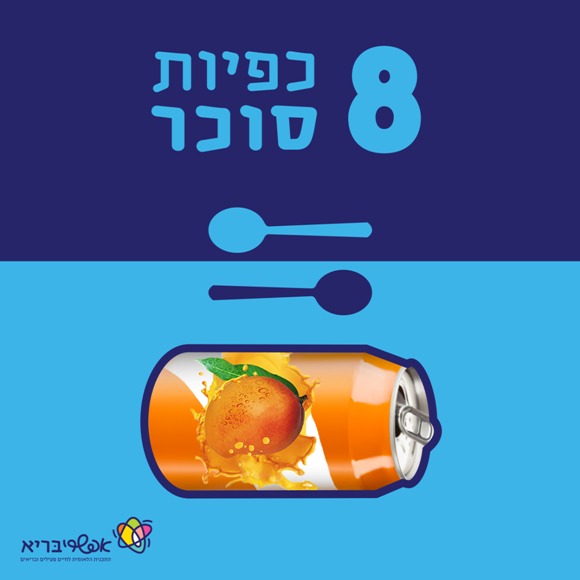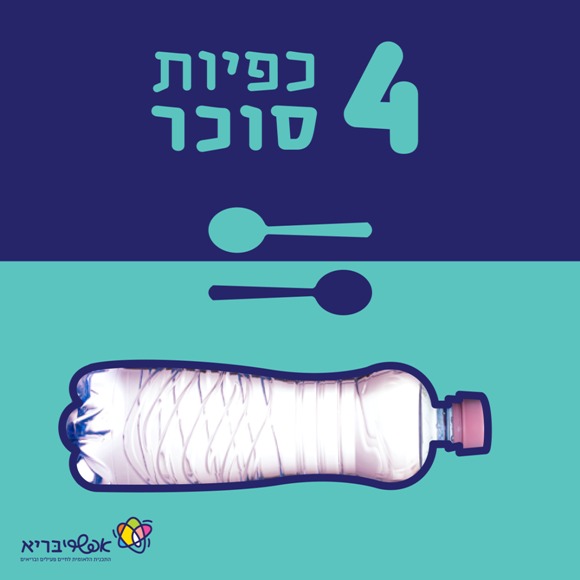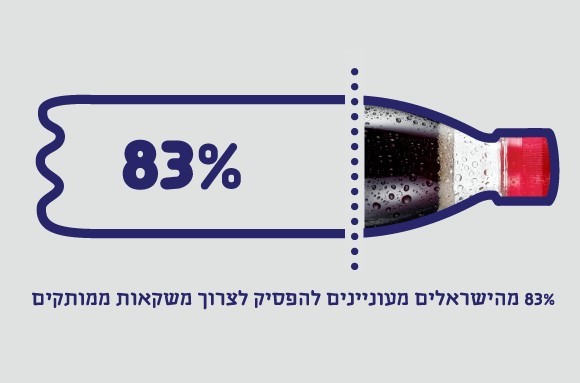
Updated: August 2022
Carbonated beverages and natural juices, collectively referred to as soft drinks, have become an integral part of our diet and for many people they even serve as a substitute for water. However, these beverages are not "soft" at all. The sheer amount of sugar in these so-called soft drinks makes them as harmful as candy. A survey on healthy behaviors among adolescents in Israel in 2014 (HBSC) found that about a third (33%) of adolescents consume sweet and sugar-sweetened beverages at least once a day! Among Arab adolescents, 49% consume these beverages, similar to the consumption rate in the same period among adolescents in the United States, where sugar intake is high.
A recent survey (in 2022), before a Ministry of Health campaign, found that drinking sugar-sweetened or diet beverages on a weekly basis (at least once a week) was reported by 76% of the general population and 84% of the Haredi sector and 85% of the Arab sector.
When quantities are rendered in teaspoons, and keeping in mind that the recommendation is to consume no more than 10-15 teaspoons of sugar a day, Israeli adolescents consume 36 teaspoons a day on average and adults – 16 teaspoons of sugar a day. These data place Israel in a high position on the table of global sugar consumption. It is important that we become aware of the quantities of sugar from beverages: a can of "soft" drink contains 8-10 teaspoons of sugar; a one and a half liter bottle contains no less than 30 teaspoons of sugar.
It is well-known that excessive sugar intake leads to weight gain. Research data show that in Israel, one in every four children is overweight. Even if you drink just one can a day, you will gain 5 to 7 kg a year from beverages alone without even taking into consideration the effects of other substances such as caffeine, food acids, flavors and preservatives that are best avoided. Beyond the weight issue, there is evidence of a connection between sugar intake and the development of other medical conditions ranging from caries and cavities to chronic diseases such as obesity, type 2 diabetes and cardiovascular diseases.

"12 teaspoons of sugar"
What's behind these appearances?
Fruit juices have a healthy and positive image but in fact they contain high quantities of sugar.
Even juices marketed as containing natural ingredients only ("100% natural fruit") contain large amounts of sugar – up to 9 teaspoons of sugar in a 400 ml bottle. Note that vitamins found naturally in fruit break down and are destroyed because of the high temperature pasteurization that these drinks undergo.

"8 teaspoons of sugar"
Flavored water is also sugar-sweetened and contains significant quantities of sugar – no less than 4 teaspoons of sugar in a 500 ml bottle! Therefore, it is recommended to regard processed juices, even if they contain natural ingredients only, and flavored water as sugar-sweetened beverages and to try to reduce their intake.

"4 teaspoons of sugar"
Sugar is hiding not only in soft drinks or juices, but also in a popular favorite of children – chocolate milk! In an average 225 ml bag of chocolate milk there are no less than 5 teaspoons of sugar!

"5 teaspoons of sugar"
Important: There are different names for sugar listed on food labels of beverages. Fructose, syrup, fruit concentrate, High-Fructose Corn Syrup (HFCS), sucrose or dextrose are all different names or substitutes of sugar.
What about "diet" drinks?
Many people think that consuming "diet" drinks is preferable to sugar-sweetened juices, but several recent studies have shown they are not a good substitute for sugar and even reinforce sugar consumption habits. These beverages often contain sugar substitutes, whether natural or artificial, as well as caffeine, flavors and other substances.
Find out more: Diet Drinks: Substitute for Sugar, Not for Health
How to reduce consumption of sugar-sweetened beverages?
The dangers of sugar-sweetened beverages have been addressed globally and some countries even tax these beverages, much like the tobacco tax, in order to limit consumption.
These guidelines can help gradually reduce consumption of sugar-sweetened beverages:
- Treat sugar-sweetened beverages as you would candy or desserts.
- Initially, dilute the drinks with water; gradually decrease the percentage of juice and increase the percentage of water.
- If using concentrate to prepare children's drinks, gradually reduce the quantities of concentrate used.
- It is recommended and important to serve water to toddlers, not sugar-sweetened beverages. It is not necessary to serve them tea, juice or any other sugar-sweetened drink. Consumption of sugar-sweetened beverages causes damage to the teeth, especially in early childhood.
- Are guests coming to visit or you just fancy a change? Adding fruit slices such as lemons or oranges or cucumbers, the leaves of mint, lemongrass or lemon verbena to personal water bottles or jugs for the family or guests, enhances the flavor and color.
Do not purchase sugar-sweetened beverages to keep at home!
The best way to avoid consuming sugar-sweetened beverages and accustoming the entire family to drink water is to simply not take home sugar-sweetened beverages. Today, a growing portion of the general public has already agreed to change habits of consuming sugar-sweetened beverages.
70% of the respondents want water to be served instead of sugar-sweetened beverages and 70% expressed willingness to host without serving sweet or sugar-sweetened beverages and to serve healthy beverages (water, water with mint and so on).

"83% of Israelis want to completely stop sugar intake"



